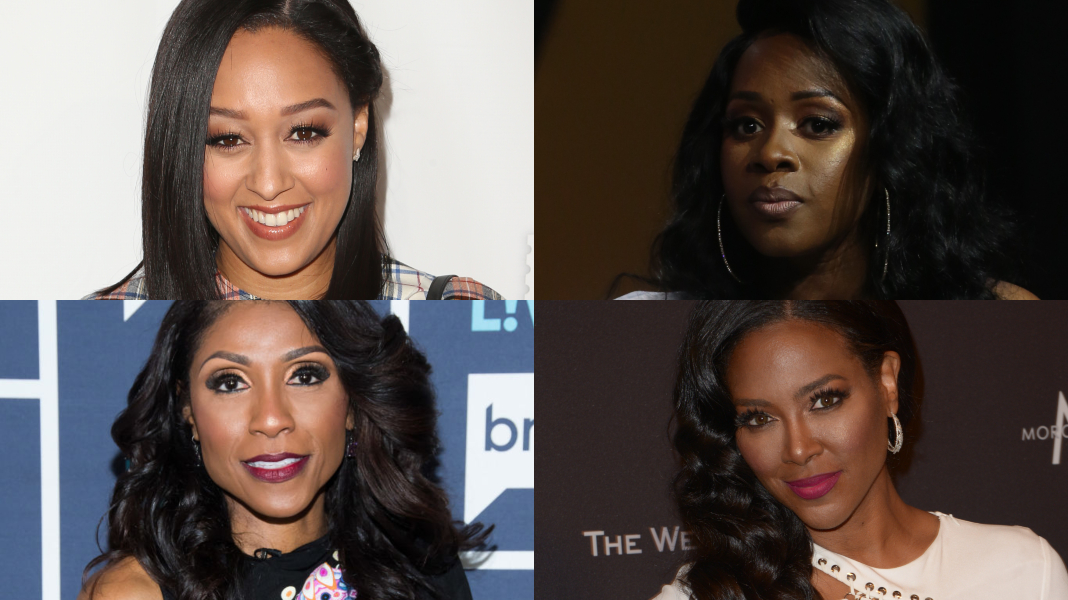
WENN/Getty
We often get to celebrate the good news with celebrities when they share that they’re expecting. We watch them as they grow in size and glow, and we are joyous with them when the child comes into the world. However, we’re not always given the same access when it comes to insight on what it all really took to get to that point. Many of these women have also struggled with infertility and health issues that delayed their attempts to have children. Thankfully though, there are some who aren’t afraid to share their stories in the hopes of providing awareness, and most importantly, helping other women feel less alone in their private struggles.
Tia Mowry, Kenya Moore, Remy Ma and Dr. Jackie Walters of Married to Medicine all took part in writing essays for Women’s Health (and OprahMag.com) to speak about their experiences with infertility while dealing with endometriosis, fibroids, cancer and miscarriages for a whole package the publication put together on Black Women and their Fertility. What the women had to say was both very intimate, but also relatable to many.
“I’d been experiencing extreme pelvic pain for year sand went to several doctors. Each one would brush me off,” Tia Mowry wrote in her essay about life before and after she was diagnosed with endometriosis. “‘Those are just really bad cramps, some women get them more severely,’ one told me. ‘Just put heat on it,’ one suggested. Another doctor simply said: ‘Get on the treadmill—working out helps.'”
Once she finally was informed that she had endometriosis, Mowry was encouraged to clean up her diet if she wanted to increase her chances of conceiving, but was stubborn about actually doing it.
“My first question was how do we get rid of it? My doctor told me you can’t cure endometriosis, but you can manage it,” she wrote. “She warned that inflammatory foods could make my symptoms worse, but to be honest with you, I didn’t really change my eating habits at that point. I was in my 20s, so I just kept eating whatever the hell I wanted.”
“I ended up needing to have multiple surgeries because my symptoms got so bad. I will never forget sitting in my doctor’s office and her telling me: ‘Look, if you want to have kids one day, and you don’t want to keep having surgeries, you’re gonna have to change your diet,'” she said. “And that’s really when I took everything to the next level. I started following a diet that limited foods like dairy, added sugar, and alcohol and focused instead on healthy choices, such as probiotics, legumes, and lower-sugar fruits.”
In the end, she got pregnant with son Cree, and when her endometriosis symptoms intensified after having him, she overhauled her diet completely. Earlier this year, she welcomed second child, Cairo, at 39. She hopes her journey will inform others and they’ll feel less alone.
“I remembered how, even though I had an amazing support system, I often felt like something was wrong with me,” she said. “I thought I was alone because no one I knew personally had dealt with this. And then I realized: I’d never really seen someone African American in the public eye talking about endometriosis or their struggles with infertility. And when you don’t know or see anyone else who looks like you talking about what you’re going through, you feel alone and suffer in silence.”
“After the miscarriage, I was like, ‘I’m calling Love and Hip Hop, I’m telling them to take all of that out of the show. I just don’t want to talk about it,'” she said. “My husband was the one who encouraged me to open up. ‘Babe, the reason why people love you and relate to you is because you’re real and you’re honest,’ he said. ‘If you say how you really feel, there’s some women out there that you’re really gonna help. And you’ll realize that it’s not just you,’ he said.”
“Hearing from so many women who had gone through similar struggles actually helped encourage me to try IVF. But it was scary,” she continued. “My husband and I sat down with a couple of different doctors until we found one who we were comfortable with, and they pretty much told us: ‘There’s not a guarantee this will work, but that does not mean that it’s not gonna happen.'”
But it did work, and she’s grateful. Her journey put into perspective for her the fact that she spent a lot of time focused on her career when she could have been trying to have a child.
“I do think time played a big part into my situation. I have an 18-year-old son, and I put off having a second baby for many years,” she said. “I’d say ‘Okay, I’m gonna do it next year…’ and then I’d get another contract. ‘Okay, I’ll do it in a few more months…’ then I’d start a new TV gig. Before I knew it, I was in my mid-30s and still putting it off, not realizing my body was not the same body I had when I had my son Jayson, when I was 20. My body’s not even the same as it was when I was 30!'”
However, things worked out how they needed to, and Remy doesn’t regret anything she went through to get to this point — preparing for the arrival of the Golden Child.
She said, “for those who are having issues starting a family, whether it’s infertility, or rebounding from a miscarriage like me, there is nothing wrong with you. You are still amazing. Whether you can or cannot bare children, it does not diminish or lessen the fact that you’re a woman, and you are you. My journey has been difficult, and a lot of women go through difficult things. But we are strong. And I wouldn’t change any single part of my story.”









